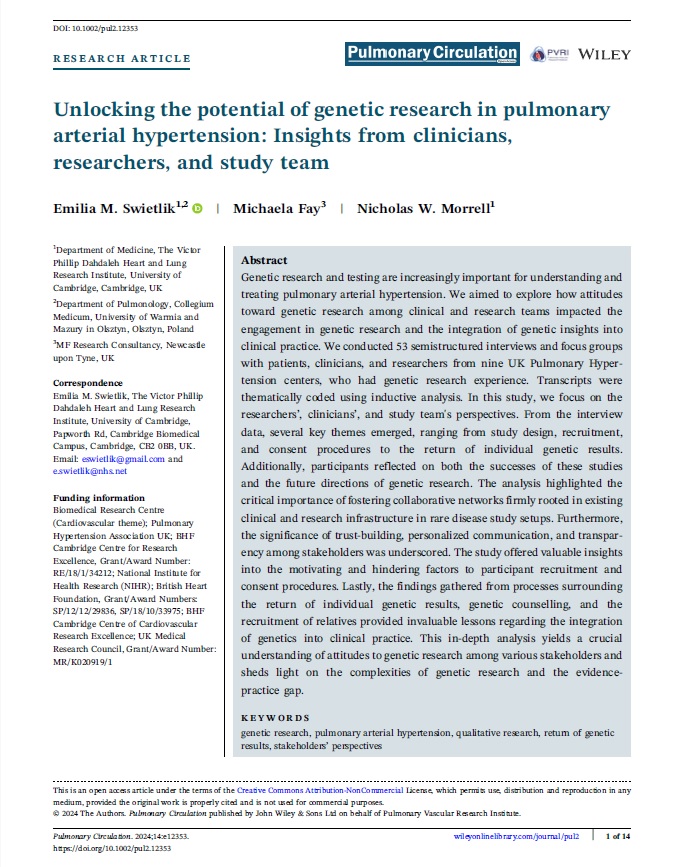Genetic association analyses of computationally derived phenotypes implicate extracellular matrix in the pathogenesis of pulmonary arterial hypertension
Study code
NBR177
Lead researcher
Dr Emilia Swietlik
Study type
Samples and data
Institution or company
University of Cambridge
Researcher type
Academic
Speciality area
Cardiovascular Disease
Summary
Overall aim of this study
The aim of this study is to recall pre-existent NIHR BioResource held blood samples from patients diagnosed with pulmonary arterial hypertension who harbor deleterious variants in new candidate risk genes (COL6A5, HPSE2, EYS, OR6T1) for DNA sequencing.
Background to the study
Pulmonary arterial hypertension (PAH), or high blood pressure in the lungs, is a rare condition that can shorten life. Approximately, 25% of patients with the idiopathic and 70% of those with a heritable form of the disease have changes (mutations) in genes associated with PAH. While these mutations are a risk factor for PAH, not all patients with the mutation develop the disease. Additional genetic and environmental factors are likely to contribute. Our most recent analysis found new candidate risk genes, which now await confirmation. Such confirmation consists of verification of the variants via Sanger sequencing, expression analysis and structural and functional studies.
Objectives of the study
- To recall pre-existing NIHR BioResource blood samples from PAH patients who harbour deleterious variants in COL6A5, HPSE2, EYS, OR6T for Sanger sequencing
Participation: For this study 106 DNA samples were provided from the BioResource.
Research publication:
Swietlik EM, Fay M & Morrell NW. 'Unlocking the potential of genetic research in pulmonary arterial hypertension: Insights from clinicians, researchers, and study team'. Pulm Circ. 2024 Mar 12;14(1):e12353 (link)
Abstract:
Genetic research and testing are increasingly important for understanding and treating pulmonary arterial hypertension. We aimed to explore how attitudes toward genetic research among clinical and research teams impacted the engagement in genetic research and the integration of genetic insights into clinical practice. We conducted 53 semi-structured interviews and focus groups with patients, clinicians, and researchers from nine UK Pulmonary Hypertension centers, who had genetic research experience. Transcripts were thematically coded using inductive analysis. In this study, we focus on the researchers', clinicians', and study team's perspectives. From the interview data, several key themes emerged, ranging from study design, recruitment, and consent procedures to the return of individual genetic results. Additionally, participants reflected on both the successes of these studies and the future directions of genetic research. The analysis highlighted the critical importance of fostering collaborative networks firmly rooted in existing clinical and research infrastructure in rare disease study setups. Furthermore, the significance of trust-building, personalized communication, and transparency among stakeholders was underscored. The study offered valuable insights into the motivating and hindering factors to participant recruitment and consent procedures. Lastly, the findings gathered from processes surrounding the return of individual genetic results, genetic counselling, and the recruitment of relatives provided invaluable lessons regarding the integration of genetics into clinical practice. This in-depth analysis yields a crucial understanding of attitudes to genetic research among various stakeholders and sheds light on the complexities of genetic research and the evidence-practice gap.
